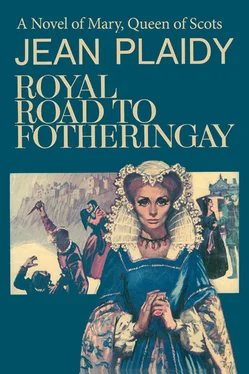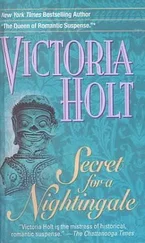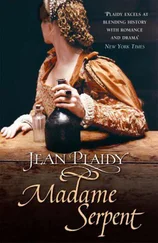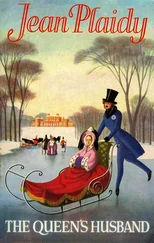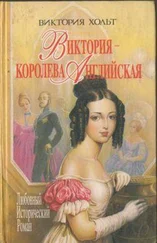Mary lay in the room above his, thinking of him constantly while John Hume, her player on the lute, and James Heron, her player on the pipe tried to beguile her with sweet music. But the music no longer charmed; she could only think of Darnley and Jean Gordon who stood between her and her lover. She planned the new dress she would have when she rose from her bed; it should contain twenty ells of red silk, four ells of taffaty and three ells of finest black velvet; there should be twenty ells of royal Scotch plaid. But what was the use? Such delights could no longer hold her attention.
Darnley came to see her. He was sulky. He had been sending letters abroad. He had reminded Philip that Mary’s friends were Moray, Bothwell and Maitland, who were all Protestants. It was Moray who was doing much harm to the Catholic cause in Scotland. Philip would readily understand how different matters would be if Darnley were King and Mary had no power to harm the Church.
He did not care so much that she turned away from him. She would rarely speak to him. She had not wished him to come, she implied. Soon he rode away. There were other women in the world besides Mary; and his head was teeming with plans for his own greatness.
When Mary rose from her bed she went to visit Bothwell. He was unable to move, for the wound in his thigh had not yet healed.
“Ah,” he said, when he saw her, “so we both came to grief, eh?”
“I thought you were dead,” she answered quietly. “They told me so.”
“It would take more than John Elliot to finish me. I’ll be up and about as soon as my flesh heals.”
“And what of your head?” she asked. She lifted the bandage and looked at the head wound. She shivered. “My dearest… I cannot bear to think what might so easily have happened.”
He took her hand and kissed it. “I am out of action,” he said. “’Tis a pity.”
“You will soon be well. I shall nurse you myself.”
“Mayhap I should go to Jean for the nursing.”
Mary’s face flamed. “That shall not be. I shall nurse you.”
He grinned.
“Did you go to Crichton?” she demanded. “Did you see her?”
“I did.”
“And did you …?”
That made him laugh. “I declare I shall break open my wounds afresh if you say such things.”
“Did you? Did you?” she cried.
“My dear Queen, what do you think? I am her husband, am I not? It is long since I saw her.”
Mary’s eyes filled with tears of rage and jealousy.
“Sometimes I wonder how I can go on loving you.”
“You should not wonder. It is very clear why you do. Now you must not be jealous. She is my wife; you are my mistress. I am content that it should be so.”
“But I am not!”
“Alas, how can you change it? By breaking away from me, of course. You could do that.”
“You do not care.”
“You will see. As soon as I am on my feet we will meet again in the Exchequer House as we did on that first encounter.”
“You should not have gone to Crichton,” she insisted.
He only shrugged his shoulders.
“You have a greater regard for her than for me!” she went on. “Yet I hear that she has no great love for you. She wanted Alexander Ogilvie. She preferred him to you and yet… you go to see her!”
“I like her,” he said quietly. “I’m fond of her. There’s no one quite like Jeannie.”
“And there are many like the Queen!”
“No. There is only one Queen and only one Jeannie. I am fond of them both.”
“But I… can give you so much more than she can.”
“What?”
“My love… myself… my honor… my …” She put her arms about his neck. “Please … do not be so cynical. You must love me. How can you go to her… when you know my feelings?”
“She might ask, How can I go to you… and with more reason. What can she give more than you can, you ask. She could give me children.”
“Could I not?”
“Not legitimate ones. So you see, she can give more than you can. You are two women. You have two eyes, a nose, a mouth, two arms, two breasts …”
“Be silent!” cried Mary, tense with emotion. Then she added: “There is one thing I could give you which she never can. A crown.”
A flame leaped into his eyes, the only sign that she had touched his smoldering ambition. She knew—and he knew—that nothing would ever be quite the same between them again.
MARY SAT ALONE in her chamber. She, with her nobles about her, had left Jedburgh and was traveling by stages to Edinburgh. Bothwell, now well enough to travel, was with them. The wound in his thigh was healed, and that was all that he had been waiting for. His head was still bandaged, but he cared little for that if he could be on his feet again.
They had rested at Craigmillar and it was in the castle there that Mary sat.
She knew there were schemes in Bothwell’s head. She knew that his attitude toward her had changed in some ways. He was as lusty as ever; he had wished—as she had—to resume their passionate relationship. But there was something else. She had more to offer him than Jean Gordon had; she had said so and he had accepted that.
She could not get Darnley out of her thoughts. Sometimes, in her dreams, she saw him lying on the floor in the supper chamber at Holyrood-house, clutching at her skirts; and as she turned shuddering from him, his face would change to that of David.
“Holy Virgin,” she often prayed, “intercede for me. Let me die now, for I believe it were better so. I am an adulteress. Let me die before I sin more deeply.”
The door of her chamber opened, and she thought it was her lover coming to her. But although Bothwell was there, he was not alone. With him were four of the lords—Moray, Maitland, Argyle and Huntley. They stood before her—five men, relentless in their struggle for power, and it was Maitland—the obvious choice as spokesman, suave and persuasive—who addressed her.
He began: “Madam, much distress is caused, not only to you but to our country, through the evil conduct of one who can bring no good to any. I speak of your husband, Lord Darnley.”
She bowed her head and, when she raised it, caught the burning eyes of Bothwell upon her.
“It is known,” went on Maitland, “that he has tried to get into communication with Spain and Rome; and his object is to do harm to Your Majesty who has done nothing but good to him. Madam, shall you tolerate such conduct, even though it is that of your own husband?”
“I am powerless to do otherwise. If we keep him under close surveillance, if we see that he does no real harm, it is the best that we can hope for.”
“Not so, Your Majesty. If you will grant pardon to Lords Morton, Ruthven and the rest who are now in exile, we, your servants, shall find means of making a divorcement between you and your husband. This is necessary, not only for Your Grace’s comfort, but for that of the realm, for if he remains with Your Majesty, he will not rest until he has done you—and the country—some evil.”
Mary saw her lovers eyes upon her. They were gleaming as they had gleamed at the time of the rape. But this time was it her body he desired to possess, or was it her crown? She tried to be calm. “I agree with what you say, my lord Maitland. But if there were a divorce it would have to be made lawful, and I could never agree to anything which would prejudice my son’s inheritance of the throne.”
Bothwell said: “It could be done. It could be done. My father was divorced from my mother but my inheritance was safe.”
“But my son is a prince, Lord Bothwell.”
“It matters not, Madam. We would arrange this matter to bring no harm to the Prince.”
Moray now spoke: “The Kirk would be against divorce.”
Читать дальше
